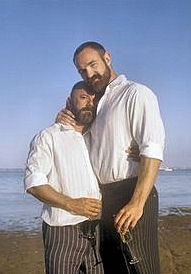I wasn’t planning two posts on the social dimension of marriage. But when I saw this post by Tom Ackerman, I thought it was perfect fit for my purposes.
I no longer recognize marriage. It’s a new thing I’m trying.
Turns out it’s fun.
Yesterday I called a woman’s spouse her boyfriend.
She says, correcting me, “He’s my husband,”
“Oh,” I say, “I no longer recognize marriage.”
The impact is obvious. I tried it on a man who has been in a relationship for years,
“How’s your longtime companion, Jill?”
“She’s my wife!”
“Yeah, well, my beliefs don’t recognize marriage.”
Fun. And instant, eyebrow-raising recognition. Suddenly the majority gets to feel what the minority feels. In a moment they feel what it’s like to have their relationship downgraded, and to have a much taken-for-granted right called into question because of another’s beliefs.
Mr. Ackerman’s little campaign might succeed in raising people’s consciousness — but I doubt it. More likely, he’ll succeed only in annoying his friends.
Ackerman can’t really put the shoe onto the other foot. He may not recognize the marriages of his heterosexual friends but, in general, society does recognize those marriages.
And so the marriages are legitimate. Not because the Church blesses them, or because the government registers them in a database somewhere.
Well, OK … in part because of the Church and the government. But the response of the broader community is just as important: the people you encounter as you go about your day-to-day activities.
Neighbours, coworkers, the loans officer at your local bank, the doctor on duty in an emergency ward, family members, friends. They have the power to bestow legitimacy on a marriage.
Or not.
That’s the point that Ackerman illustrates so poignantly. What if society withheld its recognition of your relationship? You’d be powerless to turn it into a marriage without their participation: no matter how much you loved one another, or how much you sacrificed for one another, or how many years you were faithful to one another.
A relationship isn’t a marriage until society respects it as such.
Let me return to the personal dimension of marriage for a moment. In the previous post I wrote, “To us [modern Westerners], marriage is not so much a social institution as it is a private agreement between two individuals.”
There’s some truth in that perspective. Society can’t declare you to be married without your consent. The first decision is always taken by the couple: “We’ve decided to get married.”
Then it’s up to society to respond. “How wonderful!”
Or: “You can’t get married. You’re both men.”
Whether we like it or not, marriage has both a personal dimension and a social dimension. Without both, a relationship can’t be a marriage.
In part two, I’ll talk about the social dimension of marriage as it was practised in ancient Israel. Then I’ll contrast Israel’s practices to ours.
But for now, I only wanted to drive home this foundational point: A marriage isn’t a marriage until society recognizes it as such.


Recent Comments